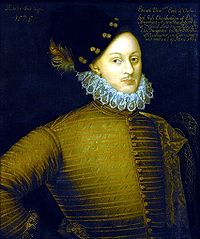- Earl of Oxford
-
Earl of Oxford is a dormant title in the Peerage of England, held for several centuries by the de Vere family from 1141 until the death of the 20th earl in 1703. The Veres were also hereditary holders of the office of master or Lord Great Chamberlain from 1133 until the death of the 18th Earl in 1625. Their primary seat was Castle Hedingham, Essex, but they held lands across England, particularly in East Anglia. Robert de Vere, 3rd Earl of Oxford, was one of the 25 barons of Magna Carta. Robert, 9th earl of Oxford and duke of Ireland (1362–92), was a favorite of King Richard II. John de Vere, 13th Earl of Oxford was a Lancastrian during the War of the Roses and Henry Tudor's commander at the Battle of Bosworth Field in 1485.[1] Edward de Vere, 17th Earl of Oxford, has become the most famous of the line because of his emergence as a popular alternative candidate as the actual author of the works of William Shakespeare (see Shakespearean authorship). Earl Edward was a ward and later son-in-law of William Cecil, 1st Baron Burghley, Queen Elizabeth I's Secretary of State. On the death of Aubrey de Vere, 20th Earl of Oxford, without heirs male, the title was in abeyance.
The title of Earl of Oxford and Earl Mortimer was created in the Peerage of Great Britain to Robert Harley in 1711. In the 20th century the title of Earl of Oxford and Asquith was created in the Peerage of the United Kingdom to the former Prime Minister H. H. Asquith, whose descendant still bears that title. These later creations bear the double title because the original earldom is not certainly known to be extinct; the first Vere earl may still have living legitimate descendants in the male line, though it would be exceedingly difficult to prove such a claim.
After the extinction of the earls of Oxford and Mortimer, the former Prime Minister H. H. Asquith (tenure 1908–1916) was keen to choose 'Earl of Oxford' for his own title. As an earldom was then traditional for former Prime Ministers, and Asquith had a number of connections with the city of Oxford, it seemed a logical choice and had the King's support. The proposal greatly offended the relatives of the dormant Earldom, however, and, in the face of their opposition, another title had to be chosen - the formal title Earl of Oxford and Asquith was finally decided as a compromise, abbreviated to Earl of Oxford in everyday conversation and letters. For information on this creation, see Earl of Oxford and Asquith.
Contents
Earls of Oxford (1141)
- Aubrey de Vere, 1st Earl of Oxford (c. 1115–1194)
- Aubrey de Vere, 2nd Earl of Oxford (c. 1164–1214)
- Robert de Vere, 3rd Earl of Oxford (c. 1173–1221)
- Hugh de Vere, 4th Earl of Oxford (c. 1208–1263)
- Robert de Vere, 5th Earl of Oxford (1240–1296) (forfeit 1265, restored soon after)
- Robert de Vere, 6th Earl of Oxford (1257–1331)
- John de Vere, 7th Earl of Oxford (1312–1360)
- Thomas de Vere, 8th Earl of Oxford (1337–1371)
- Robert de Vere, 9th Earl of Oxford (1362–1392) (forfeit 1388)
- Aubrey de Vere, 10th Earl of Oxford (1340–1400) (restored 1393)
- Richard de Vere, 11th Earl of Oxford (1385–1417)
- John de Vere, 12th Earl of Oxford (1408–1462)
- John de Vere, 13th Earl of Oxford (1442–1513) (forfeit 1475, restored 1485)
- John de Vere, 14th Earl of Oxford (1457–1526)
- John de Vere, 15th Earl of Oxford (1482–1540)
- John de Vere, 16th Earl of Oxford (1516–1562)
- Edward de Vere, 17th Earl of Oxford (1550–1604)
- Henry de Vere, 18th Earl of Oxford (1593–1625)
- Robert de Vere, 19th Earl of Oxford (1575–1632)
- Aubrey de Vere, 20th Earl of Oxford (1627–1703) (dormant 1703)
Family treeAubrey de Vere
1st Earl
(d. 1194)Aubrey de Vere
2nd Earl
(d. 1214)Robert de Vere
3rd Earl
(d. 1221)Hugh de Vere
4th Earl
(d. 1263)Robert de Vere
5th Earl
(d. 1296)Robert de Vere
6th Earl
(1257–1331)Alfonso de Vere
(d. 1328)John de Vere
7th Earl
(1312–1360)Thomas de Vere
8th Earl
(d. 1371)Aubrey de Vere
10th Earl
(1338–1400)Robert de Vere
9th Earl
(1362–1392)Richard de Vere
11th Earl
(1385–1417)John de Vere
12th Earl
(1408–1462)Robert de Vere George de Vere John de Vere
13th Earl
(1442–1513)John de Vere John de Vere
14th Earl
(1499–1526)John de Vere
15th Earl
(d. 1540)John de Vere
16th Earl
(1516–1562)Aubrey de Vere
(b. 1519)Edward de Vere
17th Earl
(1550–1604)Hugh de Vere Henry de Vere
18th Earl
(1593–1625)Robert de Vere
19th Earl
(1575–1632)Aubrey de Vere
20th Earl
(1627–1703)Earls of Oxford and Earl Mortimer (1711)
- see Earl of Oxford and Earl Mortimer
Earls of Oxford and Asquith (1925)
References
- ^ G. E. Cokayne, et al., eds., The Complete Peerage, 2nd ed., vol. 10.
Categories:- Earls of Oxford
- History of Oxford
- People from Oxford
- 1142 establishments
- 1711 establishments in England
- De Vere family
Wikimedia Foundation. 2010.

